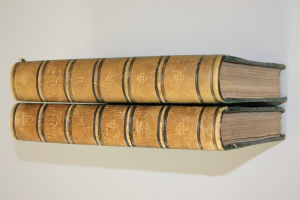Notebooks give rare insight into student life of long ago
30 Nov 2010
A collection of student notebooks, completed during lectures by one of the world’s founding fathers of economic history, have provided an important insight into how the subject was taught a century ago.

The significance of the documents, emerge on the centenary of Professor George Unwin’s appointment to The University of Manchester as the UK and Commonwealth’s first ever Chair of Economic History.
The Stockport historian, born in 1870, left Edinburgh University to start his role at Manchester in 1910.
Dr Chris Godden, who is researching the life of Unwin, came across handwritten notes taken by Edinburgh University students in 1908 together with neatly typed notes from a University of Manchester student from 1924, uncatalogued in the University’s archives.
The archives are kept at The John Rylands University Library.
The typed Manchester notes from Unwin’s lectures, covering British and global economic history, proved to be some of his last contributions, as the academic died suddenly in January 1925, aged 55.
“It’s relatively common to come across lecture notes by academics themselves from so long ago, but incredibly rare to come across notes taken by students – especially in the Humanities,” said Dr Godden.
“And it’s fascinating to compare how the subject is taught today, and how it was taught 90 years ago - I shall be studying these documents with great interest over the coming months.”
Unwin was a pioneering historian who established the first academic school of economic history in Britain at Manchester.
His work focused on the importance of kinship, different types of communities and associations, and the enterprise of individuals – a pioneering way of tackling this subject in the early twentieth century, and one that elevated the study of history above mere political history.
According to Dr Godden, Unwin rarely wrote out his lectures, but spoke from fragmentary jottings which were indecipherable to anyone but him.
He said: “These lecture notes provide insights into a lost world.
“Whereas today, lectures can be recorded and presented as podcasts, there was nothing of this when Unwin was teaching.
“He had little of what we have today – computer screens, projectors or microphones.
“But it was his enthusiasm for the subject that was important, and it was this that inspired a generation of young scholars.
“Unwin altered the presence of history in Britain, so it’s fitting that this pioneer is remembered a century after his appointment to Manchester.”
